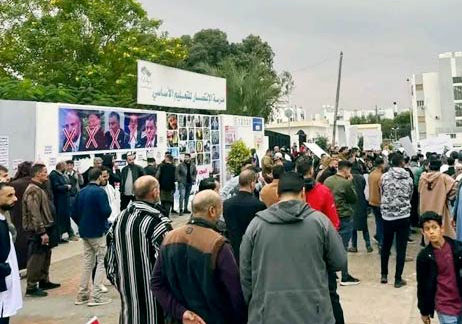Escalating CBL crisis disrupts Libya’s financial stability
Published on 2024 September 2, Monday Back to articles
Central Bank of Libya headquarters in central Tripoli
On 26 August, the Central Bank of Libya’s (CBL) Tripoli headquarters was taken over by a committee led by the Deputy Governor, Abdelfattah Ghaffar, who was appointed by the Presidential Council. Ghaffar — a close ally of the Government of National Unity (GNU) Prime Minister Abdelhamid Dbeibah — assumed control of the building with the support of GNU armed forces which are nominally part of the Ministry of Interior. The takeover was opposed by Mohamed Abdul Salam al-Shukri who rejected the Presidential Council’s decision to appoint him. The situation was further complicated when the ousted governor, Sadiq el-Kabir, fled to Türkiye — together with critical operational codes — condemning the takeover as a criminal act and calling for justice.
The House of Representatives (House) also condemned the attempted storming of the CBL headquarters. It referred to its own 20 August session and specifically, Decision No. 7 of 2024, which cancelled Decision No. 3 of 2018 regarding al-Shukri’s appointment as governor. It reaffirmed Decision No. 12 which confirming el-Kabir as governor and Marai Moftah Rahil al-Barassi as deputy governor.
The CBL employees returned to work a few days after the armed intrusion but el-Kabir, who remains abroad, has not responded to calls to accept the change, relinquish his post, and hand over the essential codes. Instead, he filed a complaint with the Attorney General, labelling the Presidential Council’s decision as ‘criminal’ and demanding accountability.
He and other senior CBL officials were forced to flee following threats from armed groups. He accused militias of terrorising bank employees, including by kidnapping their relatives to coerce them into working under duress. He criticised Dbeibah’s attempt to replace him as illegal in violation of the UN-brokered agreements regarding the bank’s control.
House speaker, Aguila Saleh, insists that the appointment of the CBL governor falls solely within the parliament’s jurisdiction and criticised the Presidential Council’s actions as illegal. He reaffirmed the House’s commitment to its constitutional duties and its authority to appoint the governor in consultation with the HCS. He underscored the importance of adhering to constitutional and international agreements, including the 2015 Libyan Political Agreement (LPA) which gives the parliament the authority to appoint the CBL governor.
Between 26 and 28 August, the country’s oil production declined sharply from 985,000 b/d to 591,000 b/d which is estimated to have cost Libya around US$120 million. The crisis — triggered by the force majeure declared by the eastern based parallel Government of National Stability (GNS) in response to the CBL takeover — has severely impacted the country’s economy.
Saleh indicated that the ongoing blockade of the oil fields and export terminals will continue until el-Kabir resumes his duties, which he claimed is necessary to protect Libya’s resources and prevent mismanagement. The House holds the Presidential Council responsible for the current confusion in the banking sector and the resultant threats and kidnappings of CBL employees. It has demanded immediate action by the Attorney General and a resolution to the crisis that respects constitutional legitimacy and avoids further destabilisation. Saleh urged all parties to adhere to legal and constitutional frameworks and avoid measures that could destabilise Libya’s political, security, and economic landscape.
In reaction, international concerns are mounting. The EU’s mission in Libya expressed its grave concern over the situation. On 30 August the US State Department reported that some banks have ‘temporarily suspended’ financial transactions with the CBL and noted that US and international banks are ‘re-evaluating’ their relationships with it because of the uncertainty created by the recent unilateral measures.
Washington reiterated its concern about the Libyan economy and the well-being of its population. It called for a resolution that does not further damage the CBL’s reputation, and urged Libyan parties to preserve its credibility and find a solution that maintains its engagement with the international financial system. The State Department emphasised the need for a political resolution that restores competent leadership at the bank, ensures transparency, and supports the people’s economic livelihoods.
Earlier, the United Nations Support Mission in Libya (UNSMIL) called for: the suspension of unilateral decisions; the lifting of force majeure on the oil fields; and a cessation of the use of force. UNSMIL also stressed the need to ensure the safety of bank employees, to prevent a potential disaster that could have severe consequences for the population. As the conflict over the CBL deepens, it poses a severe threat to Libya’s stability, with potential shortages of essential services and imports looming for millions of Libyans who rely on its functionality for their livelihoods.
This excerpt is taken from our Libya Politics & Security weekly intelligence report. Click here to receive a free sample copy. Contact info@menas.co.uk for subscription details.


